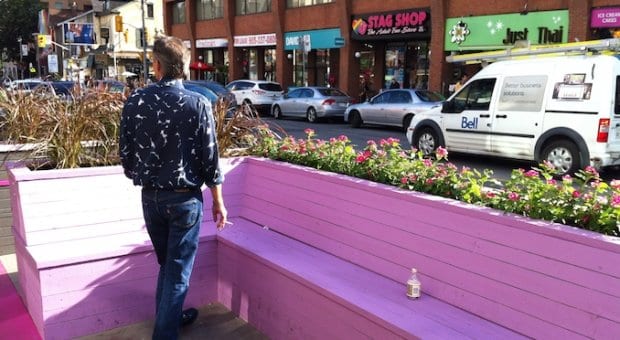A small neighbourhood battle — and online comment war — ensued after the removal of four benches from the corner of Alexander and Church streets in November 2011. What might have been viewed as an inconvenience for those who used the rather uncomfortable concrete seating was seen by many as an attempt to alter the personality of the Church-Wellesley Village.
Two years later, those who mourned the loss of the Alexander Street benches now have a number of new places to park their rear ends. The Church-Wellesley Village Business Improvement Area and the 519 Church Street Community Centre (with support from Councillor Kristyn Wong-Tam) recently teamed up to create several new street-side patios — or “parklets” — for Church Street.
The 519’s Matthew Cutler says the team modelled them after similar patios used on Yonge Street last summer during the Celebrate Yonge event. In fact, the Church Street patios are far superior.
Unlike the Yonge Street seating, which felt a bit too close to traffic for comfort, the pink-and-orange curbside patios on Church Street have been built facing away from the road, toward the strip’s businesses. They offer a variety of seating and have been parked in front of bars, restaurants and shops such as Pusateri. It’s an innovative, community-building initiative that’s already seen success in cities like Halifax, Vancouver and New York.
And it’s a much better way for the BIA to spend its money than on one-off events — such as a sidewalk sale — that its members had previously proposed. With this scheme, the City of Toronto and the BIA seem to be dipping their toes in the water, assessing whether Church Street — like Montreal’s Sainte-Catherine Street — is ready to become a pedestrian-only strip for a few months each year, which is why we should all get out and show them it is.
Drink, tan, cruise, plan a parklet picnic — it’s now up to the residents of the city’s gay village to prove we actually deserve the neighbourhood we so often complain we don’t have.
Urban studies theorist Richard Florida writes in Who’s Your City that the aesthetics of a city — “its physical beauty and natural amenities” — are public goods that should be used and enjoyed by the public.
I hope it’s possible to coerce more Torontonians outside to get pleasure from our city. For some reason, many haven’t caught on to this idea, nor has Toronto caught up with European cities when it comes to citizens making use of public space.
At the hint of a rare glimmer of summer sun, Londoners rush to Soho Square, in the heart of that city’s gay village, to enjoy a game of Frisbee or lunch on the grass with colleagues. Each evening after dinner, most Italians wander through their cobblestone streets for la passeggiata, a social ritual that persists even though Italians have as many television and iPhone screens to distract them as we do.
There’s no good reason that Cawthra Park, Allan Gardens or Queen’s Park are not as vibrant and busy as the parks of Europe. A common complaint is that downtown streets and parks are filled with “dangerous” people: drug dealers, pimps and such.
But Europe’s cities have as many (or even more) of these elements. The only reason they’re more visible on our streets and in our parks is because the rest of us are not using these spaces. Crime is down in Toronto, which remains one of the world’s safest places to live. One way to keep it down is to continue to improve our neighbourhoods using the approach known as crime prevention through environmental design (CPTED). This development model employs the use of natural surveillance by encouraging the creation of outdoor spaces with benches, tables and parks that promote social interaction.
It is exactly why, instead of lobbying to remove the Alexander Street benches, the residents of the Alexus condo should have lobbied for even more seating there. The knee-jerk bunker mentality that is increasingly common among Village residents is not befitting of Canada’s largest and most diverse city. If you don’t like lively streets, you probably shouldn’t buy a condo on one. The more people who utilize our public spaces, the more vibrant — and safe — our city will be.
Kudos to the BIA, Wong-Tam and The 519 for realizing this and for their latest positive contribution to the growth of the gaybourhood. Now let’s get out and use those parklets.
Danny Glenwright is Xtra’s managing editor.


 Why you can trust Xtra
Why you can trust Xtra


